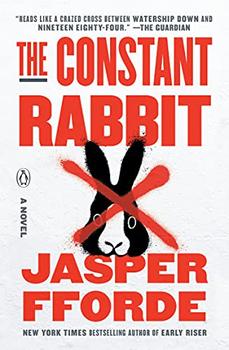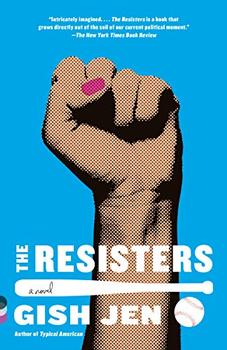Summary | Excerpt | Reviews | Beyond the book | Read-Alikes | Genres & Themes | Author Bio

A Novel
by Mat JohnsonImagine the conversation around the table at Random House when Mat Johnson's agent pitched Pym:
"This book is Eddie Murphy does The X-Files."
"No, it's Philip K. Dick with a touch of The Corrections."
"Wait, I thought it was post-colonial gothic stuff - Edgar Allan Poe meets Urkel from that old TV show..."
What genre is this thing? Pym is slow to reveal where it is going, and the mix of highbrow cultural critique and lowbrow, sitcom-worthy gags can be disorienting. The novel starts on the comic turf of the out-of-sync academic, as narrator Chris Jaynes falls from grace at the upstate New York university where he teaches. His tenure is vetoed because he won't play the part for which the administration hired him; he refuses to serve on the "toothless Diversity Committee," and he won't teach standard survey courses in African-American lit. Instead he insists on giving the same class on Edgar Allan Poe over and over again, believing he sees in Poe's famously fractured and unsuccessful novel the crux of America's racial identity crisis.
The Narrative of Arthur Gordon Pym of Nantucket, Chris claims, holds the key for "curing America's racial pathology," and by finding the source of the germ (exemplified in Poe's exaltations on "whiteness" and his demonizing of "blackness"), he believes he can alter the course of the disease. Jaynes sees himself as a misunderstood visionary: "It wasn't that I was an apolitical coward, running away from the battle. I was running so hard toward it, I was around the world and coming back in the other direction."
When Mat Johnson lays out Jaynes's views on Poe, there is a tenderness in the writing - he presents his half-serious (and maybe half-baked) cultural analysis with a light, affectionate touch and an unfailing sense of humor. In one example, on a bender after the tenure debacle, Chris bonds with the only other black guy in a downtown bar ("our fists bumped in blackademic bliss") before he realizes the other guy is his replacement. Fist bumps devolve into fisticuffs, and soon the new guy is on top, punching and muttering: "Poe. Doesn't. Matter." The seriousness with which the academic characters take their analytical priorities comes across as endearing and almost nostalgic. But when Chris Jaynes leaves the shelter of the university, the finer points of his modern racial critiques are obliterated in a slurry of unfamiliar cultural forces he can barely make sense of.
At this point, the reader has to hold on to her hat. The winds change, and the novel sets sail into the waters of another genre. There is a weird, disjointed transition as Jaynes travels around the country to assemble a crew for a polar expedition; he has discovered an historical manuscript that proves Poe's novel is a factual account and wants to go to the source of it all.
Along the way he meets the Native American Ancestry Collective of Gary (Indiana), a sea captain who collects slave memorabilia, an ex-girlfriend, and a pair of Internet celebrities. 9/11 comes up in conversation followed by a casual mention of an event called "November Three," and so do vague rumblings about apocalyptic goings-on in the world surface. Other cataclysms begin to pile up. Meanwhile Chris's childhood buddy Garth is obsessed with the escapist artwork of Thomas Karvel, Master of Light - and if that name reminds you of a certain American pop-artist, it should.
When the expedition reaches Antarctica, the novel pulls into port in the science fiction, post-apocalyptic genre - ice lairs lie hidden, and mysterious white beings ("snow honkies," as the captain calls them) lurk about. In the pristine polar whiteness, Johnson makes more searing observations about racial identity and aims more satirical jabs at modern America's obsession with filling the belly and making a buck, and Little Debbie Snack Cakes assume a totemic significance.
In Pym, Mat Johnson sails the rim between crazy-brilliant and crazy-out-of-control. I wanted to love this novel; I only have to think of the premise (a re-envisioning of one of the most chaotic American novels) to get a belly laugh, but I came away wishing Johnson had kept tighter control of the rigging. The writing is exuberant but veers into the self-indulgent (e.g. in the footnotes), and careful pruning would have made for tighter jokes. Meanwhile the plot bumps along in an almost improvisational way, which leads to some hilarious moments but also risks making the reader seasick. Still, Pym is worth the trip and leaves many questions in its wake - about race, about history, and about where the planet is headed.
![]() This review was originally published in The BookBrowse Review in April 2011, and has been updated for the
September 2012 edition.
Click here to go to this issue.
This review was originally published in The BookBrowse Review in April 2011, and has been updated for the
September 2012 edition.
Click here to go to this issue.

If you liked Pym, try these:

by Jasper Fforde
Published 2021
A new stand-alone novel from the New York Times bestselling author of Early Riser and the Thursday Next series.

by Gish Jen
Published 2021
The time: not so long from now. The place: AutoAmerica. The land: half under water. The Internet: one part artificial intelligence, one part surveillance technology, and oddly human--even funny. The people: Divided.
Your guide toexceptional books
BookBrowse seeks out and recommends the best in contemporary fiction and nonfiction—books that not only engage and entertain but also deepen our understanding of ourselves and the world around us.